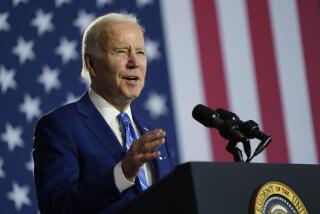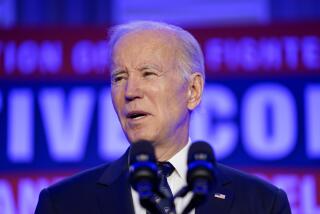Clinton Reportedly Seeking to Expand Medicare
- Share via
WASHINGTON — President Clinton is preparing to seek significant expansions of social programs by offering Medicare benefits to younger retirees and restoring food stamps to immigrants whose aid recently was cut off, administration sources said.
The proposals are part of the 1999 budget Clinton is to release next month.
Clinton has decided to recommend that Americans ages 62 to 64, many of whom can’t afford private health insurance, be allowed to pay monthly fees to receive the same services as Medicare patients.
The proposal would represent the first time in its three-decade history that Medicare would become available to able-bodied Americans younger than 65.
The issue of coverage for retirees has assumed greater importance as companies have downsized and encouraged older workers to retire at earlier ages, sometimes with no health coverage.
Many buy their own policies, but because they tend to have more health problems than younger people, “it is very expensive, if it is available at all,” said Bruce Vladeck, former administrator of the agency that runs Medicare.
Under Clinton’s proposal, some details of which were first reported in Friday’s Wall Street Journal, people ages 62 to 64 would be allowed to pay a monthly premium, roughly $300 to $400, to purchase Medicare benefits. And once they reach 65, they would pay a surcharge for the portion of their benefits that covers doctor bills, Part B, to spread the expense of their earlier coverage over their lifetime.
The food stamp proposal would restore for many legal immigrants a benefit they lost as a result of the 1996 overhaul of the nation’s welfare system. Administration officials said the proposal would cost about $2 billion over five years, although aides said Friday they are still trying to determine how many and which groups of immigrants could benefit from the change.
Several congressional Republicans questioned whether the government could afford the expanded services. And they criticized the effort to expand Medicare just before a new bipartisan commission begins exploring ways to overhaul the program so it will withstand the medical costs of the large Baby Boom generation, which will start retiring in about a decade.
More to Read
Get the L.A. Times Politics newsletter
Deeply reported insights into legislation, politics and policy from Sacramento, Washington and beyond. In your inbox twice per week.
You may occasionally receive promotional content from the Los Angeles Times.










